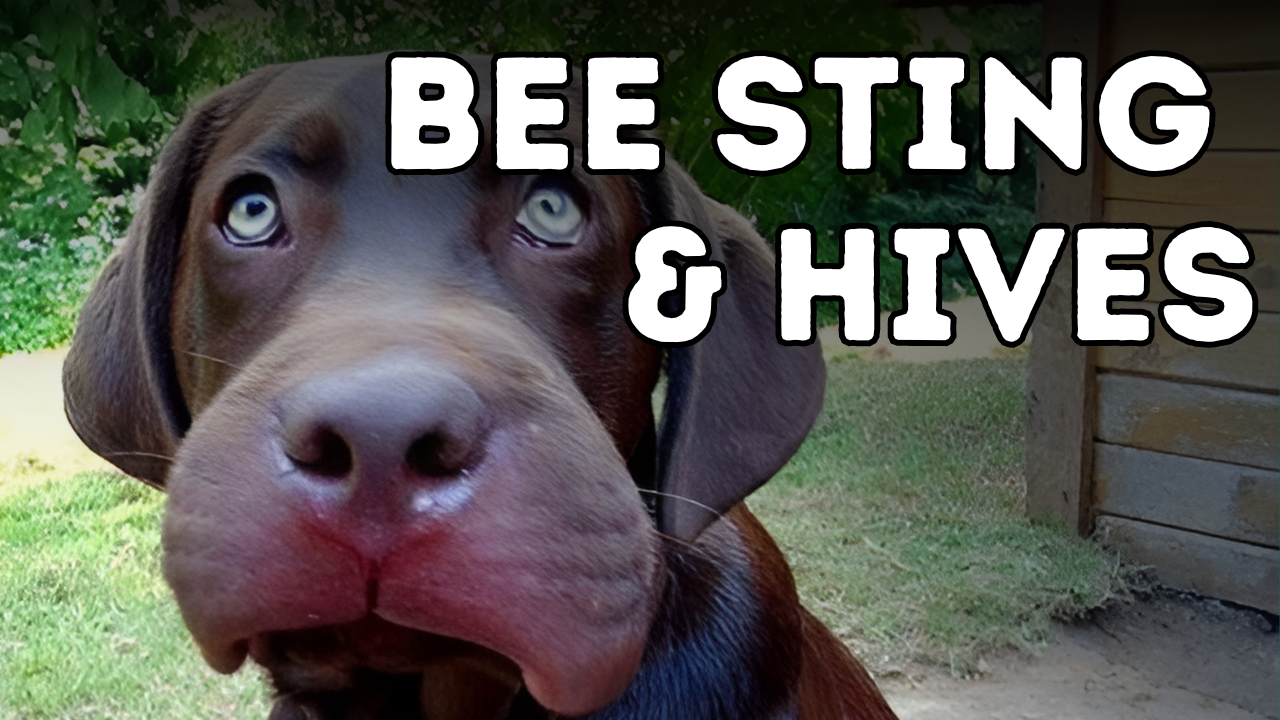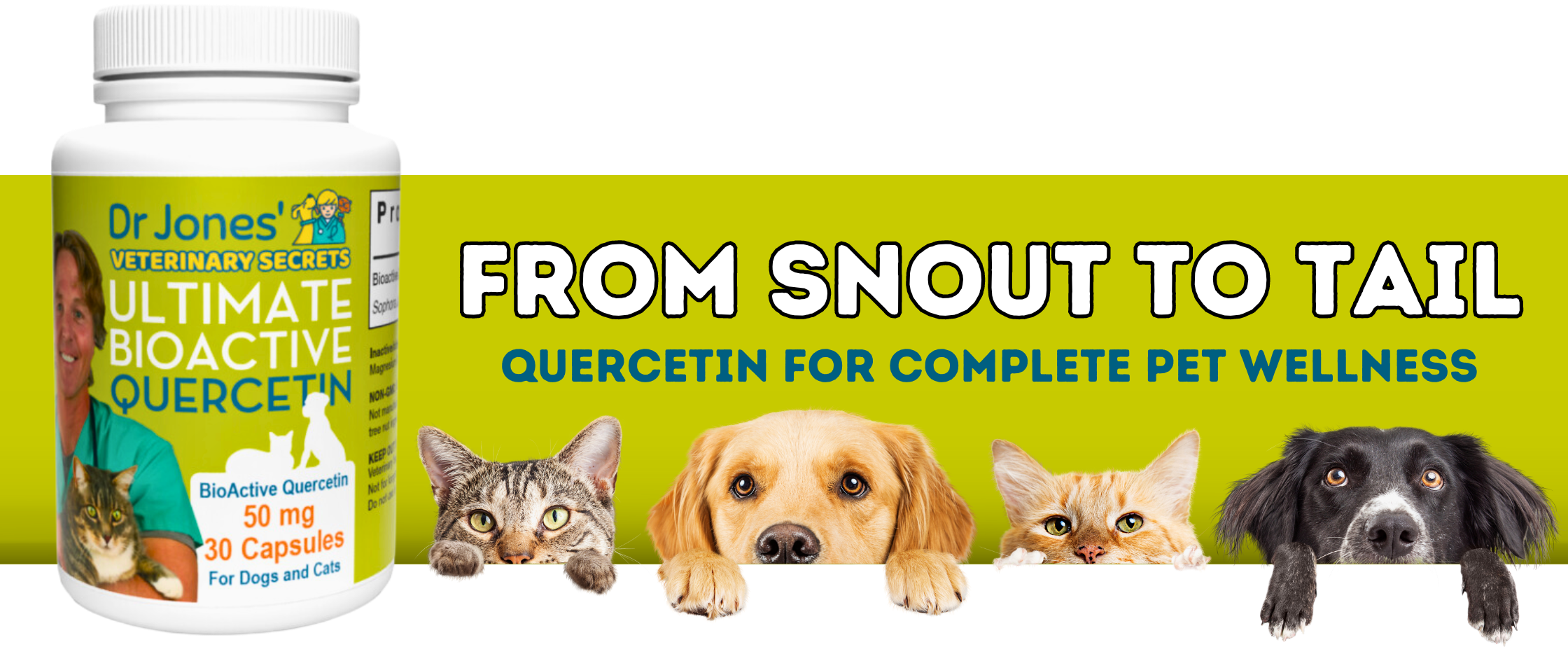What to Do If Your Pet Gets Stung and Develops Hives

Your dog or cat is pawing at their face, rubbing their eyes, and appears to be in pain.
It’s a bee sting, and now you are seeing their face swelling with bumps.
This is an allergic reaction, most likely to the insect bite/bee sting. BUT it can also be an underlying food allergy.
There is one holistic anti-inflammatory/antihistamine that can really help, and it’s a good idea to have this on hand.
It’s the bio-flavanoid found in apple peel, and is proven to be very helpful for allergic dogs and cats.
Our Quercetin Supplement is here:



What to Do for a Bee Sting or Hives on Your Pet
Identifying Signs of a Pet’s Bee Sting: Pets might show several signs after being stung by a bee. Key symptoms include drooling, swelling, excessive licking, and pawing at a specific area. If your pet suddenly cries out while digging around in a flower bush, a bee sting could be the cause. The most common sites for bee stings are the pads of the feet, the mouth, and the face. It’s also common for some pets to try and bite the bees.
Recognizing Hives: Hives appear as raised, red welts on your pet’s body, often accompanied by swelling of the muzzle and severe itching. These symptoms typically develop quickly and are caused by an allergic reaction to substances like food, insect bites, or pollen. Recurrent hives are often linked to food allergies.
Actions to Take if Your Dog or Cat Has Been Stung by a Bee or Has Hives:
-
Monitor for Allergic Reactions: Immediately after your pet is stung, it’s crucial to watch for signs of an allergic reaction. Pets that have been stung before or that experience multiple stings at once are at a higher risk. Pay close attention to your pet’s breathing and look for significant swelling at the sting site, especially if located on the neck or face. Symptoms such as vomiting or pale gums within 5-10 minutes post-sting may indicate anaphylactic shock, which requires immediate veterinary care.
-
Home Remedies for Bee Stings and Hives:
- Antihistamines: Over-the-counter antihistamines like Benadryl (diphenhydramine) at a dose of 1mg per pound every 8 hours, or Ceterazine (Zyrtec/Reactine) at a dose of 5mg per 10 pounds twice daily, can effectively reduce skin swelling.
- Natural Antihistamines: Nettle, known for its antihistamine properties, can be given at a dose of 100mg per 10 pounds twice a day for allergic reactions.
- Bioflavonoids: Quercetin, found in apple peels, has anti-inflammatory and antihistamine qualities. It is recommended at 50mg per 15 pounds daily, and can be given twice daily for hives.
- Remove the Stinger: If visible, remove the stinger with tweezers immediately to alleviate pain and prevent the spread of venom.
- Cold Compress: Apply a cold towel or ice pack to the affected area to reduce swelling and inflammation.
- Baking Soda Compress: Mix 1 teaspoon of water with enough baking soda to create a thick paste, apply it to the affected area, leave it on for 10 minutes, and then rinse off. This can help neutralize the bee venom.
-
Special Remedy for Hot Spots, Bee Stings, and Hives:
- Recipe: Combine 1/2 cup of strong black tea with one regular strength uncoated aspirin. Dissolve the aspirin in the tea, soak a gauze or cloth in the mixture, and apply it to the affected area for 10 minutes. Repeat this 2-3 times a day.
Following these steps can help manage your pet’s discomfort from bee stings and hives effectively and ensure they return to normal as swiftly as possible.
P.S. Most dogs and cats recover just fine after a bee sting/insect bite or hives. If the hives are re-ocurring, then you need to look at an underlying food allergy: do a food allergy trial. I did see this in many dogs while in veterinary practice.
P.P.S. About our new supplement that can help with Hives…
Dr. Jones’ Ultimate BioActive Quercetin is a powerful antioxidant with antihistamine, anti-inflammatory, and antiviral properties. The supplement contains naturally sourced Sophora Japonica flower extract, in capsule form (powder in capsules), and is generally more bio-available than other quercetin forms.
Get your bottle here:
Dr. Jones’ Ultimate BioActive Quercetin for Dogs and Cats
